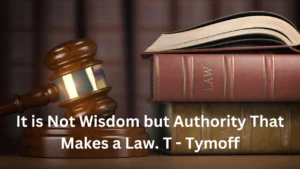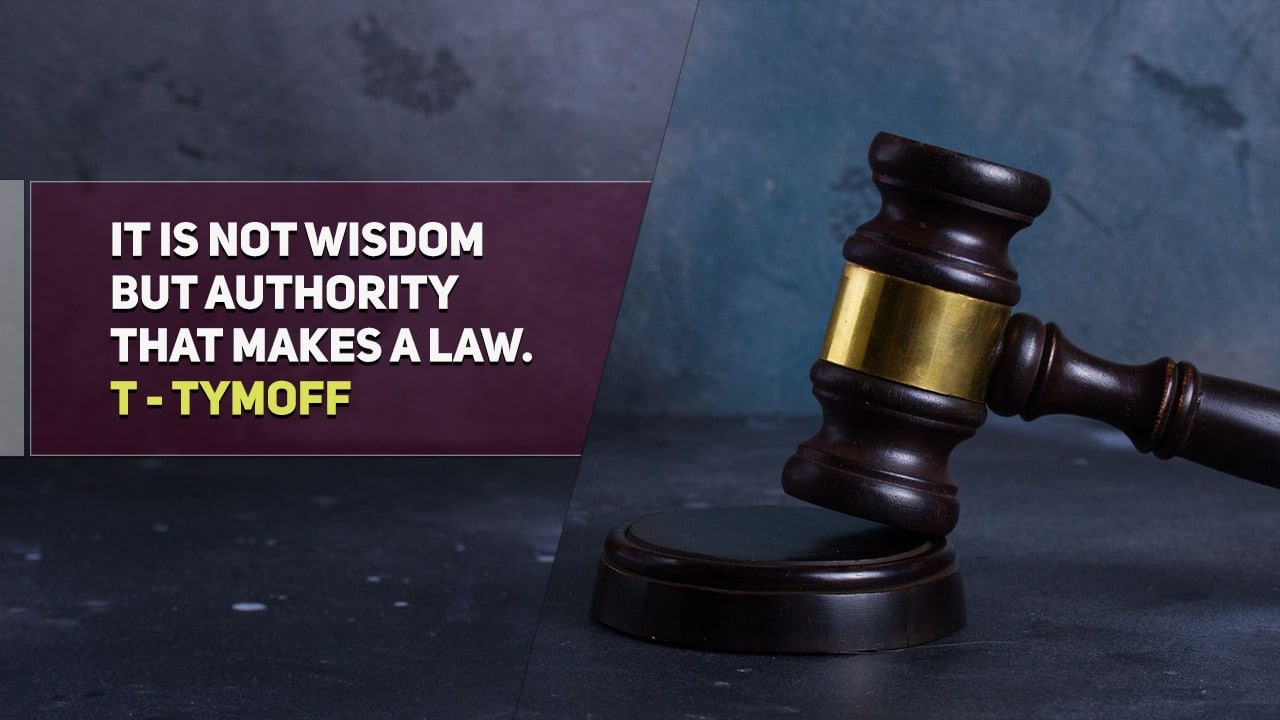Introduction
The phrase “It Is Not Wisdom but Authority That Makes a Law – T. Tymoff, underscores a powerful observation about the nature of governance and the establishment of societal rules. Laws, as they exist, are not always the product of collective wisdom but often stem from the authority wielded by those in power. This distinction reveals the complexities of lawmaking, where authority often overrides the ideals of justice, ethics, and prudence.
Authority as the Cornerstone of Legal Systems
Throughout history, authority has been the driving force behind the creation and enforcement of laws. Whether in monarchies, democracies, or autocracies, the legitimacy of law rests on the power and influence of governing bodies. This reliance on authority often means that laws reflect the priorities of those in control rather than the collective wisdom of society. Tymoff’s statement invites us to question whether this imbalance serves the greater good.
The Role of Wisdom in Shaping Just Societies
While It Is Not Wisdom but Authority That Makes a Law – T. Tymoff plays a crucial role in ensuring their fairness and relevance. A law devoid of wisdom may fulfill its function of maintaining order but can fail to uphold justice or equality. History is rife with examples where unwise laws—often shaped by narrow interests or outdated ideologies—caused harm instead of fostering progress. The tension between wisdom and authority remains a challenge in modern governance.
Historical Examples of Authority Overriding Wisdom
From ancient empires to contemporary democracies, there are countless instances where It Is Not Wisdom but Authority That Makes a Law – T. Tymoff. For example, during the Jim Crow era in the United States, laws enforcing racial segregation were products of authority rooted in systemic oppression, not wisdom. Similarly, authoritarian regimes throughout history have implemented laws that serve their interests, often disregarding the needs and rights of the people.
Modern Implications of Tymoff’s Observation
 In today’s world, It Is Not Wisdom but Authority That Makes a Law – T. Tymoff statement resonates strongly, especially in the context of global governance. With rising concerns over authoritarianism, populism, and political polarization, the balance between wisdom and authority in lawmaking is more critical than ever. Laws created under the influence of unchecked authority risk undermining democratic principles and marginalizing vulnerable groups.
In today’s world, It Is Not Wisdom but Authority That Makes a Law – T. Tymoff statement resonates strongly, especially in the context of global governance. With rising concerns over authoritarianism, populism, and political polarization, the balance between wisdom and authority in lawmaking is more critical than ever. Laws created under the influence of unchecked authority risk undermining democratic principles and marginalizing vulnerable groups.
The Relationship Between Power and Accountability
It Is Not Wisdom but Authority That Makes a Law – T. Tymoff must come with accountability to ensure that it aligns with the needs of society. Without mechanisms to check power, authority can easily devolve into tyranny. Wisdom, in this context, acts as a counterbalance, encouraging transparency, fairness, and inclusivity in legal processes. Tymoff’s insight serves as a reminder of the dangers of authority unchecked by ethical considerations.
Wisdom’s Role in Shaping Ethical Laws
Laws rooted in It Is Not Wisdom but Authority That Makes a Law – T. Tymoff often reflect ethical principles, prioritizing human rights, equity, and justice. For example, international laws protecting refugees and combating climate change are informed by collective wisdom and moral responsibility. These laws demonstrate the potential of wisdom to guide authority toward creating a fairer and more sustainable world.
Authority as a Tool for Implementation
While It Is Not Wisdom but Authority That Makes a Law – T. Tymoff is necessary for their implementation. Authority ensures compliance, upholds order, and enforces consequences for violations. However, when authority operates without wisdom, the enforcement of laws can become oppressive or arbitrary. Striking a balance between these forces is essential for effective governance.
The Role of Public Participation in Lawmaking
Public participation can bridge the gap between It Is Not Wisdom but Authority That Makes a Law – T. Tymoff in the legal system. By involving citizens in the legislative process, governments can ensure that laws reflect the collective wisdom of society. Platforms for public consultation, transparent decision-making, and civic engagement are essential for achieving this balance.
The Influence of Culture and Morality on Lawmaking
Cultural values and moral frameworks often inform the It Is Not Wisdom but Authority That Makes a Law – T. Tymoff. For example, human rights laws draw from universal moral principles, while environmental laws reflect a growing awareness of our responsibility to future generations. Authority, however, can sometimes impose laws that conflict with these cultural or moral values, leading to societal resistance and unrest.
Challenges in Balancing Wisdom and Authority
Achieving a balance between It Is Not Wisdom but Authority That Makes a Law – T. Tymoff is not without challenges. Power dynamics, political agendas, and social inequalities often skew this balance. Tymoff’s statement encourages critical reflection on how authority can be held accountable to ensure that laws serve the collective good rather than narrow interests.
The Role of Education in Promoting Wise Laws
Education plays a crucial role in fostering a society that values It Is Not Wisdom but Authority That Makes a Law – T. Tymoff. By encouraging critical thinking, ethical reasoning, and civic awareness, education empowers individuals to question authority and advocate for just laws. An informed citizenry is essential for ensuring that laws are shaped by wisdom as much as by authority.
Technological Advancements and Their Impact on Lawmaking
Technology has introduced new dimensions to the interplay between It Is Not Wisdom but Authority That Makes a Law – T. Tymoff. Tools like artificial intelligence and data analytics can provide insights to guide wise decision-making. However, they also pose risks if authority uses them unchecked, potentially leading to surveillance, bias, or exploitation. The integration of technology into governance must be guided by both wisdom and ethical considerations.
Global Perspectives on Authority and Wisdom in Law
Different countries approach the relationship between It Is Not Wisdom but Authority That Makes a Law – T. Tymoff in varied ways. Democratic nations often strive to balance these forces through checks and balances, while authoritarian regimes prioritize authority over collective wisdom. Understanding these global dynamics helps us appreciate Tymoff’s observation in a broader context, highlighting the universal importance of wisdom in governance.
The Future of Lawmaking Lessons from Tymoff’s Insight
As societies evolve, the need to align authority with It Is Not Wisdom but Authority That Makes a Law – T. Tymoff becomes increasingly urgent. Laws must adapt to address emerging challenges like climate change, digital privacy, and social justice. Tymoff’s statement serves as a timeless reminder that authority alone cannot create laws that endure; they must be guided by wisdom to remain relevant and just.
Conclusion
It Is Not Wisdom but Authority That Makes a Law – T. Tymoff observes, shedding light on the dynamics of power in lawmaking. While authority ensures order, it is wisdom that guarantees fairness and justice. Achieving harmony between these forces is the cornerstone of effective governance. As we reflect on Tymoff’s words, we are reminded of our responsibility to question authority, advocate for wise laws, and contribute to a more equitable society.
You May Also Read: Passages Malibu Logo


